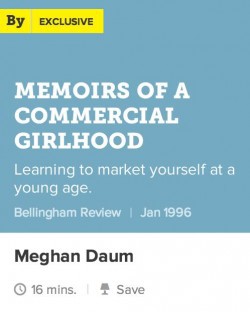New York City, December 9, 2013

★ The darkness made it possible to imagine that the week hadn’t really started yet, and crushing to realize that it had. It was raw outside, in the diminishing rain, and suffocatingly, claw-at-the-coat hot in the lobby of the preschool. Whether the rain had stopped seemed beside the point as the moisture hung in the air and dripped from the scaffolding. Drizzle was not falling so much as materializing in space all around. Brand-new copies of the Manhattan white pages, spilling out of their plastic wrapping, were soaking up the dampness by the curb, accompanied by wet flattened cartons.
Santa The Hut I Don't Know Either
If you ever wondered what a combination of Santa Claus and Jabba the Hut would look like you are a sick fuck and here’s a photo.
What Are You Reading? Part 6
by John Shankman
Over the next week for a sponsored project on behalf of Byliner, The Billfold’s Mike Dang and our publisher John Shankman will be selecting stories from the Byliner platform and chatting about them.

John: Yoooo Mike!
How goes it?
Mike: Hey John — I’m good, how are you?
John: I’m great. Looking for some quality reads, per usual.
Mike: Haha, well I got one for you!
John: My man.
Always on point
Is it a Byliner original?
Mike: This one is actually a Byliner exclusive by Meghan Daum who wrote an essay called “Memoirs of a Commercial Girlhood” in 1996 for The Bellingham Review.
You’d be into this one!
It’s about advertising.
Or rather, about being a part of an advertising family.
(John, you are my advertising family.)
John: lol
I take that as a high compliment.
What do we have if we do not have advertising families?
Is Meghan herself in advertising?
Mike: She is not, but her father wrote songs for commercials when she was a kid.
And her brother starred in those commercials sometimes.
John: spicy
sounds like a fun house
or perhaps not if megs wasn’t down with not being included
Mike: Well, she auditioned, and apparently wasn’t as good as her brother, so there were some sibling grudges held. Her father wrote songs for brands like RC Cola and Lean Cuisine. I was curious, so I looked up some jingles.
I mean, this one is kind of incredible: http://www.youtube.com/watch?v=Wm_LmlFeNnM
People don’t write those kinds of songs anymore for commercials! The story reminded me of one of my favorite songs for a commercial when I was a kid which was … can you guess?
John: I’m gonna have to go with MIKEY LIKES IT
Mike: Omg, John
CLOSE
http://www.youtube.com/watch?v=b0AGiq9j_Ak
John: THIS IS MY FAVORITE SONG
NO JOKE
forgot about this
so good
Mike: Obviously, I love that song because MIKE IS MY NAME.
But that song is also so good
And I grew up in the Jordan era I guess
So that’s what you basically just did, John.
John: its a cheery tune
of an era for sure
Mike: So the story brought back all those memories! Which made me appreciate it more.
Meghan also writes about our emotional involvement in advertising — how some commercials can make you cry. Which reminded me of ones that have made me cry too
This essay really conjured up some stuff
John: i like it.
im still trying to piece together the sort of narrative it is
is it a personal essay
recollecting her childhood?
Mike: Yes, specifically about her father and advertising, and how so much of her childhood was spent around advertising and advertisers.
John: Did she remember that fondly?
Mike: I’d say it’s bittersweet.
John: My kids will be wearing branded infant clothes so the family can earn revenue when we post photos to social networks.
Mike: I mean, if celebrities can sell their baby photos surely you can sell advertising on your kid’s onesie.
John: Fair enough, I’ve reconsidered though. I’m not gonna sell my kid out though…until their 8
okay.
so
if you could only take one piece of wisdom away from Meghan’s story, what would it be?
Mike: I guess it’d be that advertising leaves a huge impression on you, whether or not you actually believe that. BRB, going to listen to “Like Mike” again.
Interested in reading more? Byliner has thousands of great fiction and nonfiction stories. Check it out here.
Swervedriver, "Deep Wound"
WARNING: Listening to this song will briefly transport you back to a time when not only did record stores still exist but you would spend hours combing through their wares wondering whether or not you should buy an album based on its cover and what you’d heard or read about the band. This warning only applies if you’re old, though; younger listeners will probably be all, “What?” [Via]
Mountain Goats Good At Not Dying
“Resilient goats delight onlookers after they survive being buried by an avalanche in the French Alps” is the description. You are wondering to yourself, is it possible that such a remarkable story might have been captured on video? I am here to tell you that not only is it possible, it did indeed occur.
Diversion Tactics
by C. D. Hermelin

1. Back in May, at around 2 o’clock in the afternoon, a man stopped me on a busy street in the Financial District of New York City. We were under blue scaffolding, partially shaded from the bright, sunny day. He motioned for me to take my headphones out of my ears — a Strokes song was playing — and after I did, he said in a low tone, “Give me your phone and your wallet.”
2. I smiled. I tried to move out of his way. He got into my way again.
3. I asked, “Are you joking?”
4. He poked me in my side. I looked down and saw the barrel of a handgun sticking out of his sweatshirt pocket. We were on a wide stretch of sidewalk made less wide by the construction scaffolding, huddled near the temporary fence. I looked at the three construction crew members who had stopped moving their truck to watch. Across the street, down the block, even in the middle of Pearl Street itself, suit-wearing executives walked by with their own headphones in their ears.
5. I took my wallet out of my back pocket and gave it to him, but it was surprising to me how much time I had to think about this one action. I had time to weigh my options — perhaps I could give him just one of the two things he was asking for, and in that case, my wallet seemed less valuable than my phone. Right after I handed it to him, I remember that I thought: damn, I just bought a new monthly unlimited Metro card.
6. He put my wallet in his sweatshirt pocket, along with the gun. I tried to look him in the eye, but his wraparound sunglasses reflected my worried face. “The phone,” he said.
7. At the time, it seemed like cool logic, systematically argued and decided upon by a sober committee of experts: I should yell, get someone’s attention.
8. I did. I punctuated everything with a swear. “This man has a fucking gun! This man stole my fucking wallet!”
9. The construction crew members watched, suit-wearing executives walked right by.
10. There’s a long history of violence in broad daylight, of humans standing idly by while something horrible happens.
11. The man started to move away from me, keeping his side with the gun barrel pointed towards me. “Shut up. I will shoot you,” he said, rather calmly. I was not calm. Now I took out my own phone. He shook his head as I moved away from him and dialed 911.
12. A shot rang out. Not like in the movies. The three construction workers were watching us like we were.
13. I felt a searing pain in my leg, but the sound of the shot wasn’t deafening. I stayed on the phone, I spoke to the dispatcher. She told me to follow the man at a safe distance. She asked me to describe him. “He’s mid to late 40s, white male, not a lot of hair, heavyset, wearing jeans and a sweatshirt.” She made me repeat it. I interrupted myself to shout my refrain: “He stole my wallet! Stop him! He has a gun!”
14. Then he did a surprising thing: He stopped and threw the wallet at me. For some reason, that did not stop me from continuing the chase.
15. My leg didn’t hurt, which made me more brave. It dawned on me that the reason that the shot sounded quiet and I wasn’t writhing in agony on Pearl Street because the gun wasn’t real. It shot BB pellets.
16. We moved through a disinterested crowd, jogging around the block, three right turns, down a side alley. He turned around and faced me for the first time since he’d shot me, and then ducked into the entrance of an underground parking garage.
17. I didn’t follow him. I related it to the dispatcher, breathless. She told me to get inside my building and assured me that the police were on their way. She kept asking for me to repeat information, and then repeated the information back to me, incredulous. “In the financial district? In Manhattan?”
18. 40 minutes later, the police arrived. In the meantime, I was shaky. I felt strange. I went upstairs and told my boss at the leasing office what happened. She listened to the whole story, and laughed at some points, and apologized for laughing. She made sure I knew where the first aid kit was before she called her boss and told him the story. No, I’m not lying, I could hear her saying. I’m not kidding.
19. I went into the bathroom and looked at my leg, my upper thigh. The BB hadn’t even torn through my jeans, but the impact left a bleeding, nickel-sized circle of broken skin. I sat down and cleaned the impression with rubbing alcohol and Neosporin.
20. I read Bluets by Maggie Nelson while I waited for the police to arrive. I was surprised, when they showed up, how engrossed I was in the text. Diversion tactics.
21. They were apologetic for the delay. They were competent, kind and calm. I can’t remember their names. I do remember that it was the driver, the sergeant’s, last day. “I’ve never heard of something like this happening down here,” he said. I wanted to say, “Crime is up downtown, according to the Village Voice,” but I worried that I didn’t remember the article correctly, partially because I didn’t read the whole thing. Just the headline. If I read every word of every bad and scary thing published about New York City, and then believed it, it would inevitably turn into believing that any and all of those things will happen to me. Fear is only useful in small doses.
22. “This never happens,” he said again, but that didn’t help me feel any better. He sent his partner to go get tapes from the neighborhood’s security cameras. The Financial District is nothing if not well-watched.
23. (And yet.) I kept thinking back to pushing my way upstream, through all of the dark-colored suits filled with people that weren’t helping. In the course of 3 minutes, as we jogged through the Financial District, I hoped someone would see him running and stop him, the man running with a gun, chased by a twenty-something in jeans and a button-up shirt.
24. At the station for Precinct 1, the detectives offered me an ambulance, or, a “guy from MS” which I decided, from context clues, meant “medical services.” My leg didn’t hurt, so I declined. I thought about the last cop show I watched: “Elementary,” the modern, American adaptation of Sherlock Holmes. I can’t be the only person who ever ended up in a police station and pretended like I was in a crime show. I played “helpful confused guy” because that’s what I was and hoped that they would offer answers to my silent questions:
25. Am I safe? Is what I have, my memory of the event and your scribbled notes, enough to get this guy? Should I tweet about this?
26. I clicked through a database of mug shots. The sergeant who was in the middle of his last day told me that, “The right man will pop! out at you.” No one popped. Some of them were dead ringers for stand-up comedians. A lot of the men wore Hawaiian shirts.
27. They took pictures of my wound, which is an awkward position, halfway down my thigh. I had to unbutton my pants for their photo. They held up a business card for scale, and then gave me that business card as a contact.
28. I had blue underwear on.
29. I spent time in the station waiting for someone to come and swab my wallet for fingerprints. A flyer amongst others for protocol changes and police business announced the party for the Sergeant’s last day. I told the policemen that no one took notice of the incident. They shook their heads. One of them said, “typical.” I wanted a small amount of outrage, but instead I got bland acknowledgement. They had accepted that people don’t help other people. That’s maybe why they had become cops.
30. Months later, they still haven’t caught the guy. Or if they have, no one told me. I found an article about the incident that got nearly every detail wrong, which makes me wonder if the one new detail — that a knife and BB gun were found discarded in the area — is true.
31. Whenever I tell people about what happened, they are shocked that no one came running. My roommate is convinced that it would have only taken one person, and then everyone would have leaped into action. I like to think that if I had been around, and this happened to someone else, I would have changed my stride, but it’s impossible to know. And I’d rather not find out. It’s easier to have lofty ideals about yourself when they will probably go untested.
32. At that point, still waiting for the fingerprint specialist, my head had cleared. I thought about the Spiderman movies, which always have a part where New Yorkers rush to help Peter Parker. I know a superhero movie is the least likely thing to be based on fact, but I guess I hoped it could be grounded in some deep-seated truth about a helpful, New York City-based well of human kindness.
33. I traced my finger along my jeans, around the spot on my leg where the BB hit. The BB might still be on Pearl Street, I think, I could go back for it. I was mugged and then shot. But the mugging was reversed in moments, at the whim of my attacker, and the shot wasn’t a real bullet. It’s surreal, like details from a Kafka short story. I was mugged and shot, but I also wasn’t.
34. When the police released me, I went straight to a concert I had won tickets to, an invite-only performance by the National at the Park Avenue Armory. When I arrived, my friend hugged me, and we read our books in line. She stopped reading once in a while to ask me questions. Was I okay? Should we go home? Yes, and no.
35. The concert started. The band was bathed in blue light, swathed in shadows and made small by the cavernous armory, which reminded me of an empty train station. The place lit up with patterned spotlights and fog. The air filled with songs about melancholy at broken hearts and innocence lost. Even though I tried, I couldn’t remember any of their lyrics, so I couldn’t sing along.
C.D. Hermelin is a 26-year-old writer living in Brooklyn. He is on Twitter. Photo by Michael Daddino.
Fucking Masterfulness Of Movie Appreciated
“The way information is doled out in this film is fucking masterful, an absolute clinic in implication and inference — none of the key events that drive the story forward and fuck with the main character occur onscreen — and the math of plotting is absolutely airtight.”
— You almost certainly will not guess, but once you see what it is you will either think, “Oh, right, that is completely correct” or “I need to see this movie,” and both of those thoughts will also be completely correct.
Time Lapses
“David Peterson edited a time-lapse video using photos from the International Space Station publicly available from NASA” is the explanation for this and yes, it sure is mesmerizing, the ineffable majesty of the universe captured and conveyed in the form of a time-lapse video etc. but my question to you is am I the only one who keeps waiting for a Tori Amos vocal to come in on the soundtrack? It sounds like it’s going to turn into a Tori Amos song is what I’m saying.
Soul-Crushing Anguish Of Television-Watching After Midnight Acknowledged
“Is there anything lonelier and more depressing than watching Roseanne late at night when you can’t sleep?”
— This terrible truth was buried in the back of Jonathan van Meter’s recent Julia Louis-Dreyfus profile and I thought its horrible honesty deserved better than to be hidden under a bushel.
Gestures Elucidated
This GIF gallery of hand gestures for critical discourse is good but it lacks the [right hand moving up and down an imaginary shaft to suggest disdain for tedious wankery, a.k.a. “the jerk-off”] motion. Hopefully they will add that soon. [Via]
